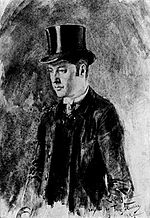Jules Laforgue
| Jules Laforgue | |
|---|---|

Portrait of Laforgue, 1885
|
|
| Born |
16 August 1860 Montevideo |
| Died | 20 August 1887 (aged 27) Paris |
Jules Laforgue (French: [ʒyl lafɔʁɡ]; 16 August 1860 – 20 August 1887) was a Franco-Uruguayan poet, often referred to as a Symbolist poet. Critics and commentators have also pointed to Impressionism as a direct influence and his poetry has been called "part-symbolist, part-impressionist".
His parents, Charles-Benoît Laforgue and Pauline Lacollay, met in Uruguay where his father worked first as a teacher and then a bank employee. Jules was the second of eleven children in the family, the eldest child being Jules' brother Émile, who was to become a sculptor of note. In 1866 the family moved back to France, to Tarbes, his father's hometown, but in 1867 Jules's father and mother chose to return to Uruguay, taking along their nine younger children, leaving Jules and his older brother Émile in Tarbes to be raised with a cousin's family.
In 1876 Jules's father took the family to Paris. In 1877 his mother died of pneumonia, three months after a miscarriage, and Jules, never a good student, failed his baccalaureate exams. (His classmate Henri Bergson passed, and went on to great intellectual achievement as a philosopher.) He failed again in 1878, and then a third time, but on his own began to read the great French authors and visit the museums of Paris.
In 1879 his father became sick and returned to Tarbes, but Jules stayed behind in Paris. He published his first poem in Toulouse. By the end of the year, he had published several poems and was noticed by well-known authors. In 1880 he moved in the literary circles of the capital and became a protégé of Paul Bourget, the editor of the review La Vie moderne.
Much happened to Laforgue in 1881: he attended a course of Taine's lectures and developed a great interest in painting and art. Charles Ephrussi, a rich collector, one of the first collectors of Impressionist art, took Laforgue on as his secretary. The direct influence of Impressionism on Laforgue's early development as a poet is a topic in Laforgue studies. In his introduction to his edition of Les Complaintes, Michael Collie, author of a biography of Laforgue (Laforgue (1963)), states that he sees a more or less conscious attempt on Laforgue's part to produce a literary equivalent of Impressionism. In 1881 Laforgue wrote a novel, Stephane Vassiliew and prepared a collection of poems entitled The Tears of the Earth, which he later abandoned, though some pieces were altered for Les Complaintes. Also in 1881 his sister left him alone in Paris to tend to their father who was seriously ill in Tarbes. Around that time, he also began to frequent Le Chat Noir and adopted the style of fumisterie (smoke screening). The origins of this can be found in Willette's panel cartoon, launched in the Parisian cabaret, which centered on a clown called "Pierrot fumiste" and exerted significant influence on Laforgue. When his father died, Laforgue did not attend his father's funeral.
...
Wikipedia
